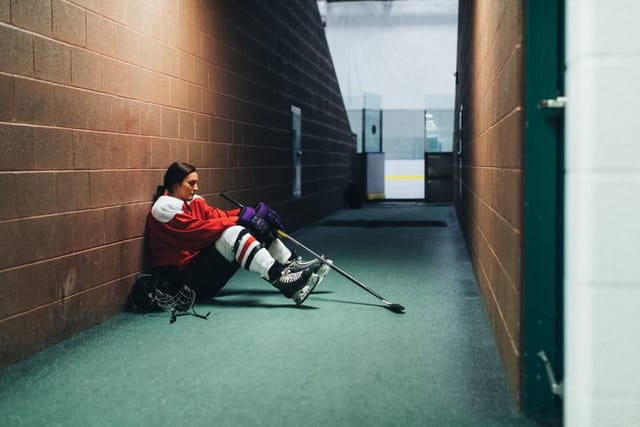You can’t win every time.
It’s impossible to win every time in life, but some people simply can’t accept defeat. Instead of seeing a loss as an opportunity to improve and do better next time, they take it personally and lash out, creating unnecessary drama and conflict when they really should just move on. Whether they’re playing an actual sports game or they’re simply players in the game of life, here’s how sore losers bring everyone around them down.
1. They Cast Blame.

Some people, when faced with defeat, tend to shift the responsibility elsewhere. They distribute blame to teammates, opponents, or even the game itself. Not only does this behavior divert from the actual game, but it also creates a tense environment. It leaves everyone on edge and makes people wish they never bothered to play with this person at all.
2. They Have Poor Sportsmanship.

When on the losing side, certain people act in ways that can overshadow the friendly spirit of the game, whether literal or figurative. Sulking, arguing, or bending the rules to their favor becomes a regular occurrence. This disrupts the relaxed and enjoyable atmosphere. Instead of a shared experience of fun and competition, the game can turn into a battleground of complaints and disagreements.
3. They Refuse to Acknowledge Other People’s Success.

There are players who find it hard to accept their loss and acknowledge the winners. Their dismissive attitude can turn the post-game interaction into an uncomfortable experience. Instead of celebrating the spirit of the game and appreciating a well-played match, they create a vibe of resentment and bitterness. Fun. (Not!)
4. They Dwell on Their Losses.

Some people carry their defeats in life with them like an extra piece of heavy luggage. Instead of treating each day as a new opportunity, they bring past losses into the present. This inability to let go of defeat can cast a shadow over every new experience, reducing the excitement and anticipation that come with starting fresh. It can also deter them from fully engaging in things they try in the future due to the fear of repeating past mistakes.
5. They Lack Humility and Graciousness.

Humility and graciousness in defeat are traits that certain people struggle to adopt. This leads to unnecessary arguments and tension, preventing everyone from enjoying the process. Not only that, but it can affect the overall spirit of the activity in question, turning what should be a friendly, laid-back experience into a heated dispute. It’s challenging to focus on the matter at hand when you’re navigating around someone’s ego.
6. They Create Conflict.

Some people handle defeat by stirring up conflicts. This can involve arguing about the rules or challenging the decisions of a boss, referee, or other mediator, which just causes unnecessary tension. The atmosphere can quickly shift from enjoyable to stressful, diminishing the value of the experience as a whole. Instead of relaxing and enjoying themselves, some people may find themselves in the middle of unnecessary fights.
7. They Demoralize Their Team.

People who focus excessively on their defeat can negatively impact their team’s spirit and motivation. Their lack of enthusiasm can spread through the rest of the team — be they colleagues, friends, or actual teammates — which affects everyone’s morale and performance. This can lead to a lack of team spirit and a less enjoyable experience for everyone involved. When one person acts out while everyone else keeps a more positive attitude, it sticks out like a sore thumb.
8. They Disrespect the Game.

Sometimes, the genuine spirit of the game is overlooked. Actions like breaking rules, arguing with the referee, or belittling the sport are not conducive to a fun and respectful game. These actions not only disrupt the flow of the game but also diminish its value. It can lead to a lack of respect for the sport, the players, and the communal experience that games are meant to provide.
9. They Fail to Improve.

People who are too busy blaming everyone else for their losses in life often miss opportunities for self-improvement and learning. This lack of self-reflection can hinder not only their progress but also the overall quality of their lives. It’s important to use defeats as learning experiences to improve future performance. However, that’s not possible if the person isn’t willing to accept their mistakes and learn from them.
10. They Rob Themselves of Enjoyment.

Interestingly, by focusing only on winning, people often miss out on the joy of the game itself. They rob themselves of the opportunity to enjoy the camaraderie, the thrill of competition, and the simple pleasure of playing. This mindset can lead to a lack of fulfillment, even when participating in a game they love. In the end, the game should be about enjoyment and personal growth, not just the final score.
11. They Overreact to Mistakes.

Some people overreact to their own mistakes or other people’s. A minor mistake can trigger an exaggerated response, disrupting the flow of the game. This behavior not only heightens the pressure during the game but also takes away from the fun element. It’s like turning a friendly game into a high-stakes pressure cooker, which can be stressful for everyone involved.
12. They Show A Defeatist Attitude.

Some players reveal a defeatist attitude the moment the game seems to tilt in favor of their opponents. They behave as if the game is already lost, which can dampen the team’s spirit. Instead of motivating their team to try harder and turn the game around, they contribute to a pessimistic atmosphere. This negativity can be infectious, affecting the morale and performance of the entire team.
13. They’re Uncooperative.

Players who struggle with defeat often become uncooperative during the game. They might refuse to follow team strategies or ignore their responsibilities within the team. This lack of cooperation can disrupt the team’s dynamics and hinder the overall performance. It’s like trying to play a symphony with an instrument that refuses to stay in tune.
14. They Lack Persistence.

Some players tend to give up easily when facing a tough game. Instead of showing tenacity and fighting spirit, they might slack off or stop trying altogether. This lack of persistence can affect the game’s outcome and the team’s motivation to push through challenging situations. It’s like running a marathon and deciding to walk after the first mile.
15. They Disregard Constructive Criticism.

Players who don’t handle defeat well often disregard constructive criticism. They might take feedback personally, which can prevent them from learning and improving. This behavior can hinder their growth as players and negatively affect the team’s ability to work together effectively. It’s like trying to improve a recipe but ignoring all suggestions for tweaks and changes.
16. They Have Negative Body Language.
Body language speaks volumes, and players struggling with defeat often exhibit negative body language. This can include crossed arms, slumped shoulders, or lack of eye contact. This non-verbal communication can transmit negativity to the rest of the team and opponents alike, creating an unfriendly gaming environment. It’s like speaking a language of defeat that everyone can understand, even without words.
17. They Show A Lack of Respect for Opponents.

Respect for opponents is a crucial part of any game. However, some players show a lack of respect when they’re losing. They might resort to derogatory comments or inappropriate actions that go against the spirit of the game. This lack of respect can tarnish the friendly and respectful atmosphere that games are meant to foster. It’s like forgetting the golden rule of sportsmanship: Treat others how you want to be treated.
Enjoy this piece? Give it a like and follow Bolde on MSN for more!




